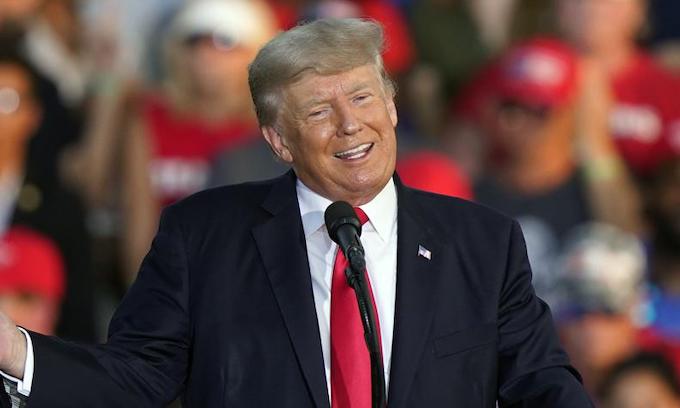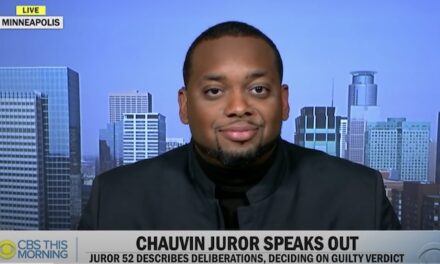Former President Donald Trump will remain in the spotlight at the GOP debate next week, even if he stays away from the Milwaukee stage where his Republican rivals will vie for attention—and potential votes—from a national TV audience.
At the same time, the lower-ranking presidential hopefuls are walking a tightrope. Whether they take the Aug. 23 debate stage or not, they’re mired in a campaign dilemma: attacking—or defending—the popular Republican frontrunner who has been indicted in four cases.
Attackers risk alienating President Trump’s broad base of supporters, who have joined him in denouncing a “witch hunt” that produced 91 “bogus” criminal charges. Defenders risk coming across as wishy-washy apologists, and ultimately boosting President Trump’s candidacy even more.
“It’s a real pickle … and I don’t envy any of them being in this position,” said David Barker, a government professor at American University (AU), during an Aug. 16 C-SPAN panel discussion of the 2024 presidential race.
He and four other panelists also examined what factors might play a big role if there is a rematch between Democrat President Joe Biden and the Republican former president.
In 2020, while President Trump was still in office, the two men went head-to-head in an election that ended with the Democrat being declared the winner. President Trump vociferously disputes President Biden’s victory to this day, leading to some of the criminal accusations he now faces.
Last-Minute Change?
While President Trump could enter the debate at the last minute, experts say that seems unlikely.
The former president has stated that he sees little advantage to participating while he is the runaway favorite for his party’s nomination.
Meanwhile, the Democrat party has scheduled no debates. That leaves President Biden as the presumptive nominee. Although environmentalist Robert F. Kennedy Jr. is running a vigorous campaign, he’s running 50 percentage points behind the incumbent president, according to the RealClear Politics average of national opinion polls.
On the Republican side, Florida Gov. Ron DeSantis is President Trump’s nearest rival amid a crowded field of hopefuls. But RealClear Politics reports that Mr. DeSantis is running 40 percentage points behind the former president.
As of Aug. 16, President Trump still was refusing to throw his support behind the eventual Republican nominee, if someone other than him wins the contest. The Republican National Committee (RNC) is requiring all presidential contenders to sign a “loyalty pledge” before being allowed on the debate stage.
If Mr. Trump does join the debate, his presence will drastically change how it plays out. Another big factor: what topics Fox News debate moderators Bret Baier and Martha MacCallum choose to explore, said Amy Dacey, executive director of a policy and politics institute at AU.
“I think it’s going to be some version of: “No-show Trump’s still the star,'” Mr. Barker said. “I don’t think he’s going to show up. But I think that he’s going to be ‘the elephant in the room,’ and everybody’s gonna be talking about him.”
‘Viral Moment’ Could Strike
So far, President Trump’s legal dramas have overshadowed all other issues in the 2024 presidential race.
But the debate may help shift the conversation—and could prove pivotal for one or more of the candidates, the AU panel said.
“It’s really about the possibility of a viral moment, which could be helpful or harmful,” said Jordan Tama, provost associate professor at AU’s School of International Service.
Any of the candidates could be involved in a debate-stage exchange that “shoots them upward or downward,” he said.
Molly O’Rourke, an executive in residence at AU’s communications school, sees the race right now as “an internal food fight” among Republicans who are trying to “elbow each other out of their way.”
She thinks the stakes are highest for Mr. DeSantis.
“If he doesn’t get back on track after this debate, I mean, I don’t really know that this campaign is fixable at this point,” she said. “They have a very narrow window here to fix that.”
Contrast Between Trump and DeSantis
Mr. DeSantis’s campaign is widely viewed as floundering. In part, that may be attributable to a “narrative” that has taken hold, Mr. Barker said.
In public appearances, the Florida governor can seem awkward and “actually comes across as though he hates the voters when he has to talk to them,” Mr. Barker said, “and that’s a problem.”
In contrast, President Trump, whom The Chicago Tribune labeled “the people’s billionaire” decades ago, comes across as folksy and down-to-earth.
He exudes “a certain kind of charisma or charm” that appeals to a certain segment of the population, Mr. Barker said.
Despite the “bombast and all the lunacy” associated with the former president, he seems to present as “positive” or “joyous,” with “a little bit of a wink … a glimmer in his eye,” Mr. Barker said.
Those are qualities that Mr. DeSantis seems to lack; he can come across as “joyless,” he said.
Such descriptions of Mr. DeSantis have begun to define him as a candidate, Mr. Barker said, adding: “It’s becoming harder and harder for him to cut loose from that—and I’m not sure he can.”
He said that, if he were Mr. DeSantis, he would change his strategy; he advised Mr. DeSantis to become “as combative as he possibly can.”
“It’s part of the way that Trump got his loyal following in the first place,” Mr. Barker said. That’s also how Mr. DeSantis began to gain national attention, “by attacking elites, attacking the media … attacking the professoriate, attacking the intellectuals,” Mr. Barker said.
If Mr. DeSantis does that, he might be able to “score some points and get some viral media coverage out of it,” he said.
Other Candidates Influential
Even candidates who are predicted to have very little chance of winning the GOP nomination are influencing the race and could create fireworks at the debate, Ms. O’Rourke said.
For example, challenger Chris Christie, a former New Jersey governor and federal prosecutor, has been “very aggressive in litigating the case against Trump,” she said.
Thus, Mr. Christie has been taking pressure off his fellow challengers. But he also is in a position to “put heat on them” if he urges them to “take some sort of pledge” against President Trump, Ms. O’Rourke said.
In addition, entrepreneur Vivek Ramaswamy has promised that, if he is elected president, he would pardon President Trump—which could put his fellow contenders under pressure to follow suit.
Mr. Barker said a candidate can navigate this dilemma by promising to pardon President Trump and later reneging on that promise by simply stating something like, “We know more now than we did then … and so now I can change my position.”
If President Trump does become the nominee, as widely predicted, Ms. O’Rourke thinks that his legal troubles could have “an exhausting, deflating effect on turnout” in the general election.
‘Bidenomics’ and Ukraine Spending
As the general election gets closer, the economy will likely become an increasingly important issue, said Gabriel Mathy, AU associate professor of economics.
“There’s a lot of discontent out there about the economy. Even though inflation is slowing, people are unhappy about high prices. They’d like inflation not just to slow, but for prices to reverse and go back to something like what they were before we had this bout of inflation,” he said.
That’s why he foresees more attacks on President Biden’s economic policies, dubbed, “Bidenomics.”
Economists “think it’s looking pretty good that unemployment is pretty low,” Mr. Mathy said, but that isn’t swaying voters much.
He criticized Republicans for lacking a “really clear economic policy.”
“They’re continuing to do the same playbook of tax cuts,” Mr. Mathy said.
Mr. Tama hopes that foreign policy starts to become a bigger part of the presidential race. He notes a schism between people “who think the U.S. should pull back from the world” and stay out of foreign wars versus those who believe in continuing to support Ukraine in its war against the Russian invasion.
He noted that the majority of Republicans in Congress still support robust assistance for Ukraine, despite President Trump’s opposition.
But Mr. Barker said he has detected “a steady evolution, month by month, toward Trump’s point of view” among Republican voters.
‘Swing Voters’ Could Decide 2024
Another key to winning the 2024 election: snaring support from diverse voting blocs.
While candidates recognize that the Hispanic vote has become very important, they need to recognize that there are significant differences even within those subgroups. For example, the Hispanic population in Nevada is much more blue-collar than it is in Arizona, Ms. O’Rourke said.
“The parties will need to make very specific targeted investments,” she said, as a message that resonates in Wisconsin could fall flat in Georgia.
Mr. Barker noted “a striking trend:” Hispanics have been migrating toward Republican candidates across the nation—except in Arizona.
Mr. Tama said that, regardless of specific demographics, so-called “swing voters” could ultimately decide the winner of the presidency in 2024.
“They may only represent maybe 5 percent of the electorate,” he said, but their impact could be decisive because presidential elections in America have tended to be decided by thin margins.
“There are voters out there that voted for Barack Obama, then voted for Donald Trump, and then voted for Joe Biden,” he said. “Who will they vote for in this election? That could make a huge difference in the states where the race is likely to be close.”



















“If President Trump does become the nominee, as widely predicted, Ms. O’Rourke thinks that his legal troubles could have “an exhausting, deflating effect on turnout” in the general election.”
This is exactly what the treasonous, destructive, lying, woke Democrat Party and its corrupt Department of Justice is attempting to do.
But it is having the opposite effect. The rational Voters are seeing even more how this traitorous banana republic Democrat Party operates and don’t want any part of this corrupt, unethical, immoral Democrat Party.
The lies, cons, deceptions, hypocrisy, and treachery of this treasonous, woke, socialist Democrat Party cabal and their delusional supporters know no bounds. The Democrat Party will do or say Anything to control the U.S. and the people. Even manipulate elections to put their corrupt, demented, obedient puppet Joe Beijing Biden into office. 🙁 🙁 🙁
Exactly. THEY WANT US TO be too worried about all the legal ******* that they are WILLFULLY HEAPING on trump, to keep us from GOING OUT TO VOTE.
Custer also thought what worked in the past would work in the present. Sooner or later you can’t dodge all the bullets and stationary Trump will take one like Custer if he does not appear and face the public and face the music or an unsuspected fat lady will appear and sing him off stage. Debate or appear a coward, with not enough truth to advance his campaign. If he fails to show for the debate, it won’t be DeSantis who makes his last stand, but Trump who makes his last squat. Real men ride to the sound of the guns, not hide in the basement bunker with Joe.
Trump will be the main target if he’s at the debate or not! Biden’s economy may be another target but Trump will be the greater target I believe. The candidates ON STAGE will be walking a ‘line’ trying to point out why Trump shouldn’t be the nominee of the Republican party (like 1} his call to overthrown all rules even those in the CONSTITUTION 2}his encouragement of the rioters on J6 3} his call to GA to ‘find votes more than Trump has’ 4} the UN-electability of election deniers proven by the 2022 general election) without alienating those that have fallen under the ‘spell of Trump’.
TDS is strong, even in a # of republicans..
Those of us who live in Florida know, without question, that Ron DeSantis does NOT hate us.
Why not ask the governors who locked down their citizens illegally and literally tortured them for three years who “hates” their voters.